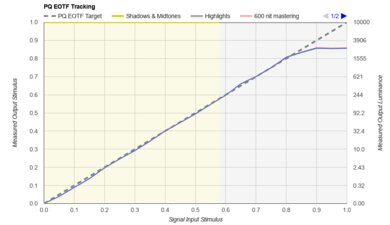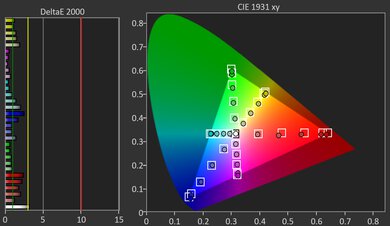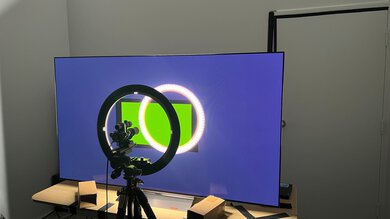
If you're looking for a new TV for your home theater setup, there are a few things that you should pay attention to to get the best movie-watching experience possible. Contrast ratio is the ratio between the luminance of the brightest white and darkest black that a TV can produce. High contrast means that a TV can display deep blacks, which helps to improve the perceived depth of an image. Furthermore, TVs with great contrast ratios are better at emphasizing bright highlights in HDR, which is why OLEDs, which have a near-infinite contrast ratio due to their perfect blacks, typically offer the best overall HDR movie-watching experience.
With the rise of HDR movies, HDR brightness plays a big role in how impactful those movies are. This is where high-end TVs have the biggest advantage, as HDR content uses their higher brightness capabilities to show lifelike highlights. Since the content dictates the brightness of HDR movies, you'll want a TV that can come close or fully display highlights at the brightness level a filmmaker intends. A TV with limited HDR peak brightness can't properly display highlights, so the overall image will lack impact. A TV's color gamut is another big factor for watching movies in HDR. Through our testing, we can see if a TV displays the wide range of colors needed for a vibrant HDR movie-watching experience.
What if you don't strictly watch high-quality HDR movies through streaming or on disc? That's where image processing comes in. Upscaling capabilities are pretty self-explanatory, and we test whether or not a TV does a good job upscaling low-resolution content. If it doesn't, you will end up with an image that looks soft and lacks detail. Low-quality content smoothing is the term we use to describe how a TV removes artifacts from low-bitrate content. If a TV performs well here, you won't see many artifacts like macro-blocking during dark scenes.
Below are our recommendations for the best TVs for movies you can buy. See our picks for the best OLED TVs, the best bright room TVs, and the best 4k TVs, or vote on which ones you want us to buy and test. You could also consider one of the best home projectors or best home theater projectors instead of a TV. To learn more about the 2025 TV models, check out our 2025 TV lineup page.
-
Best TV For Watching Movies
Home Theater8.9Resolution 4kNative Refresh Rate120HzScreen FinishGlossyType OLEDSub-TypeQD-OLEDDolby VisionYesSizes 55" 65" 77"The best TV for movies we've tested is the Sony A95L OLED. Its nearly infinite contrast ratio makes it a fantastic TV for watching movies in a dark room. This results in deep, inky blacks and bright highlights, with no distracting blooming around bright areas of the scene. Sony TVs are well respected for their accurate picture quality, and this TV is no exception. Its excellent processing capabilities deliver a true movie experience that respects the content creator's intent, with very little banding in areas of similar color.
HDR movies look incredible on this TV thanks to its high peak brightness in HDR, near-infinite contrast ratio, and wide color gamut. Colors look vibrant and lifelike, and bright specular highlights stand out. It also supports features like Dolby Vision and DTS:X audio, ensuring you get the best movie experience possible. It's compatible with Sony's BRAVIA CORE streaming service, which offers a wide selection of movies to stream at a much higher bit rate than most streaming services, ensuring your movies look the best they possibly can.
-
Best Bright Room TV For Watching Movies
Home Theater8.6Resolution 4kNative Refresh Rate120HzScreen FinishGlossyType LEDSub-TypeVADolby VisionYesSizes 65" 75" 85"The Sony BRAVIA 9 QLED is the best TV for watching movies in a bright room. It easily overcomes glare due to its superb SDR brightness and reflection handling, so you don't have to deal with distracting reflections. If you watch movies with the lights off, the TV looks spectacular in a dark room due to its exceptional local dimming feature that provides fantastically deep blacks with very little blooming. On top of that, its exceptional HDR brightness delivers highlights that pop out in HDR content. It's also a standout option for a home theater due to its support for Dolby Vision HDR and DTS audio formats, fantastic image processing, and accuracy in both SDR and HDR. No matter how you watch your movies, this TV truly delivers.
Despite having a wider viewing angle than many other LED models, it's still narrow, so the TV still isn't the best choice for watching movies with a large group of friends. Unfortunately, the TV only comes in a 65-inch, 75-inch, and 85-inch model, so there's no option for those looking for a smaller TV for a bedroom or small living room.
-
Best Upper Mid-Range TV For Watching Movies
Home Theater8.5Resolution 4kNative Refresh Rate144HzScreen FinishGlossyType OLEDSub-TypeWOLEDDolby VisionYesSizes 42" 48" 55" 65" 77" 83"If you like the deep, inky blacks that only an OLED can produce but find the Sony A95L OLED too expensive, the best upper mid-range TV for watching movies is the LG C4 OLED. Like the Sony OLED, it displays perfect blacks in dark rooms without blooming, offering a fantastic movie-watching experience. You don't get the same incredibly vibrant and bright colors as you do on a QD-OLED like the A95L, but the TV still displays a wide range of colors that are sure to impress film buffs. You also get slightly better low-quality content smoothing than the Sony, and the LG's upscaling is almost as good, too.
This TV isn't as bright as an OLED like the A95L, but it's still bright enough to use in a room with the lights on while watching SDR movies, and its great HDR peak brightness is certainly enough to make most highlights stand out. You also still get the same support for DTS audio formats and Dolby Vision, so whether you're watching older movies on DVD or new movies on 4k Blu-ray, this TV has you covered.
-
Best Mid-Range TV For Watching Movies
Home Theater8.3Resolution 4kNative Refresh Rate120HzScreen FinishGlossyType OLEDSub-TypeWOLEDDolby VisionYesSizes 48" 55" 65" 77" 83"If you like the LG C4 OLED but find it's too pricey, the LG B4 OLED is a great mid-range TV and can serve as an excellent entry point into the OLED market. The TV has all the features of the more expensive C4, and it still delivers outstanding picture quality, especially in a dark room, with its near-infinite contrast ratio delivering deep, inky blacks with no distracting blooming. On the other hand, the TV is dimmer than its more expensive sibling, but the difference isn't massive. It's a little bit dimmer than the C4 in SDR, but it's still pretty bright for an OLED and has fantastic reflection handling, so it does overcome glare in rooms with some lights on. It's quite a bit dimmer in HDR, but fortunately, it's bright enough to deliver impactful highlights in HDR movies.
It displays the same vibrant colors as the C4 and has the same support for Dolby Vision and DTS audio formats. You also get similarly impressive image processing, and it runs the same great webOS smart interface as the more expensive LG, with the same point-and-press smart remote.
-
Best Lower Mid-Range TV For Watching Movies
Home Theater7.5Resolution 4kNative Refresh Rate144HzScreen FinishGlossyType LEDSub-TypeVA (except 75")Dolby VisionYesSizes 55" 65" 75" 85"If you want high-end performance but don't want to spend high-end prices, or if you watch movies in mostly bright rooms, check out the Hisense U7N. It's cheaper than anything recommended up to this point but still delivers excellent overall picture quality. It has a great Mini LED backlight, letting it simultaneously provide incredibly bright highlights and deep blacks, although there's blooming around bright objects in dark scenes. HDR content looks great, and it supports both Dolby Vision HDR and HDR10+ for the best HDR experience possible, as well as advanced audio formats, like DTS:X over eARC.
The TV has very good image processing overall, making it a cheaper option for a home theater setup than the more expensive models from LG and Sony. Unfortunately, its viewing angle is sub-par, making it a bad choice for a wide seating arrangement. It runs the Google TV interface, which is fast and easy to use, and it has a great selection of streaming features, so you're sure to find your favorite shows.
-
Best Budget TV For Watching Movies
HDR Movies7.6Resolution 4kNative Refresh Rate60 HzScreen FinishSemi-glossType LEDSub-TypeVADolby VisionYesSizes 55" 65" 75" 85"The best budget TV for watching movies we've tested is the Hisense U6/U6N. It's a great TV for the price and has a fantastic local dimming feature that provides deep blacks in a dark room, although there's the same noticeable blooming around bright objects as there is on the more expensive Hisense U7N. It's also very good for watching movies in HDR due to its ability to display a wide range of colors, so HDR content looks vibrant and lifelike. It has just okay peak brightness in HDR, so bright highlights don't stand out as well as on more expensive TVs like the U7N, but it's good enough for a great dark or moderately lit room movie experience. Like the more expensive Hisense, this TV supports HDR10+, Dolby Vision, and DTS audio formats.
Unfortunately, its low-quality content smoothing is significantly worse than the U7N, so there's visible digital noise when watching low-bitrate content from streaming platforms or DVDs. However, its upscaling is just as good, so low-resolution content is sharp, and the TV preserves fine details well. It even has the same easy-to-use Google TV interface as the more expensive model.
Notable Mentions
- Samsung S90D OLED:
The Samsung S90D OLED is an amazing TV and is overall the best value QD-OLED you can get. However, the Sony A95L OLED is better for watching movies due to its advanced audio format support, Dolby Vision support, superior image processing, and better accuracy.
See our review - LG G4 OLED:
If you love the sound of the LG C4 OLED but wish it were brighter, consider the LG G4 OLED. It has all the same features as the C4, like Dolby Vision and DTS audio passthrough, but it's noticeably brighter in both SDR and HDR. Unfortunately, it's very expensive, and a TV like the Sony A95L OLED has the edge when it comes to colors.
See our review - Samsung QN90D/QN90DD QLED: The Samsung QN90D/QN90DD QLED is an amazing TV. It's a bit brighter overall than the Sony BRAVIA 9 QLED, so it performs excellently in a bright room. However, the Sony model has the edge when watching movies due to its significantly better contrast, support for Dolby Vision HDR and DTS audio formats, and better image processing. See our review
- Hisense U8/U8N:
If you like the Hisense U7N but wish it were brighter and had better contrast, the Hisense U8/U8N is an excellent option. Thanks to its remarkable SDR brightness, the TV easily overcomes glare and displays incredibly bright highlights in HDR movies. It also has amazing black levels for an LED model, but you still don't get the deep, inky blacks you get from an OLED like the LG B4 OLED.
See our review
Recent Updates
-
Added a link to our 2025 TV lineup article and confirmed the accuracy of our current picks.
-
Updated the introduction to make it clearer and more concise.
-
Sep 12, 2024 : Replaced the Sony A75L OLED with the LG B4 OLED in the 'Best Mid-Range TV For Watching Movies' category. We also replaced the Hisense U6/U6K, Hisense U7K, and LG C3 OLED with their 2024 successors and refreshed the Notable Mentions section.
-
Jun 17, 2024 : We replaced the Sony X93L/X93CL with the Sony BRAVIA 9 QLED as our pick for the 'Best Bright Room TV For Watching Movies.' We also moved the Sony X93L/X93CL to the Notable Mentions section, removed the TCL QM8/QM850G QLED from that section, and refreshed some text for accuracy.
-
May 23, 2024 : Added information about the 2024 Hisense U6N and the Hisense U7N in the 'Best Budget TV For Watching Movies' and the 'Best Lower Mid-Range TV For Watching Movies' categories. We also refreshed some text throughout for accuracy.
All Reviews
Our recommendations above are what we think are currently the best TVs for movies for most people in each price range. We factor in the price (a cheaper TV wins over a pricier one if the difference isn't worth it), feedback from our visitors, and availability (no TVs that are difficult to find or almost out of stock everywhere).
If you would like to do the work of choosing yourself, here is the list of all our TV reviews. Be careful not to get too caught up in the details. While no TV is perfect, most TVs are great enough to please almost everyone, and the differences are often not noticeable unless you really look for them.
Comments
Best Movie TVs: Main Discussion
What do you think of our picks? Let us know below.
Looking for a personalized buying recommendation from the RTINGS.com experts? Insiders have direct access to buying advice on our insider forum.
Update: Minor text changes. No change in recommendations. Added the Lenovo ThinkPad P1 Gen 4 (2021), Dell Precision 5570 (2022), ASUS TUF Dash F15 (2022), and the Dell XPS 13 Plus (2022) as Notable Mentions.
What do you think of these changes? Let us know
















![Hisense U7N [U7, U75N] Design Picture](https://i.rtings.com/assets/products/VNHIW7eU/hisense-u7n-u7-u75n/design-small.jpg?format=auto)
![Hisense U7N [U7, U75N] In-Test Picture](https://i.rtings.com/assets/products/dRAQg3kh/hisense-u7n-u7-u75n/in-test-small.jpg?format=auto)
![Hisense U7N [U7, U75N] PQ EOTF Graph](https://i.rtings.com/assets/products/76HdaUQX/hisense-u7n-u7-u75n/pqeotf-graph-small.jpg?format=auto)
![Hisense U7N [U7, U75N] Pre Color Picture](https://i.rtings.com/assets/products/JZcTrv01/hisense-u7n-u7-u75n/pre-colorspace-small.jpg?format=auto)


















































